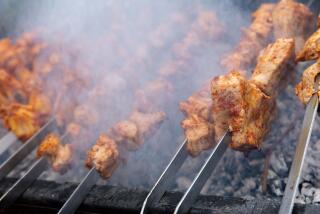Snipping out a living on the razor’s edge
- Share via
Reporting from Islamabad, Pakistan — The barber’s mirror hangs on tree limbs lashed together to make a vanity. His customers wait their turns sitting on cinder blocks. His floor is not black-and-white checkerboard linoleum, but a patch of dirt. A tarp suspended by branches keeps his clients from getting drenched during the monsoons.
Call it a shave and a haircut, two bits — Pakistani style.
In this country, the barber, the masseuse, the moneychanger and the shoemaker often ply their trades wherever their bare, calloused feet take them. That can be a boulevard median, a knoll overlooking a highway, a thicket of trees in a city park.
For Nasir Ali, a grove of trees wedged between a playground and a tony neighborhood of balconied, marble-floor homes makes the perfect spot for his tattered vinyl barber chair. His customers aren’t the Pakistani elite or khaki-clad Western diplomats who live in those homes, but their gardeners, guards, cooks and servants.
They can afford Ali’s price: 30 Pakistani rupees, about 35 cents. It fits my budget too, so I stride down a dirt path to Ali’s alfresco salon, where armies of ants scurry through the clumps of black hair encircling the barber chair.
“Collar length in the back, short on the sides, a bit longer on top,” I tell him.
“Rough cut?”
“Okay,” I say, “rough cut.” Whatever that means.
Ali’s father and grandfather were barbers. His two brothers are barbers — one has a shop and the other prefers the open spaces, as Ali does.
Ali, 28, works from 9 a.m. until dusk, seven days a week for a pittance that’s just enough to feed his family.
For the sake of speed, he keeps chitchat to a minimum and forsakes the “Please sir, move your head forward” coddling you get at a salon. Stiff finger jabs to the sides and back of the head get immediate results. When asked why he works so fast, Ali thrusts his comb toward a long row of laborers in dirty tunics waiting their turn. “That’s why,” he says.
Ali has been cutting hair in his little corner of the forest for about a year. Across the street, a camp of paramilitary troops was attacked by a suicide bomber four months before Ali arrived. The camp could get hit again, he says, and that bothers him. City officials came to his barber chair last year and suggested he move to a safer location.
“They didn’t force me to leave, but they said, ‘Take care, watch your surroundings, and don’t take unknown people as customers,’ ” Ali says. “Yes, there’s always that fear of working in areas that could be a potential target for terrorism.”
But there’s also the fear of not knowing where your next rupee will be coming from. So Ali stayed.
Nearly finished, Ali picks up a yellow-handled straight razor, puts in a new blade from an old car wax container and shaves the back of my neck. I ask how he copes with the contrasts of Pakistani weather — late summer monsoon downpours that pound the city with sheets of rain, 110-degree heat that bakes the capital in midsummer.
Ali shrugs. The only time he shuts down is if a squall is fierce enough to topple his set-up. “If the storm is very big, I close. Otherwise, no problems.”
Ali’s done. There’s no blow-dry, no gel, not even a hand mirror to check the back of my head. But that’s all right. I hand him 30 rupees.
Before I leave, I ask whether the city ever gives him guff for working outdoors like this. Technically, Ali and the other Pakistanis who conduct their businesses in open spaces, outside of commercial districts, are breaking the law, he says. But it’s a law local authorities almost never enforce.
“City authorities don’t take action against people like me,” he says, “because they figure we are poor people. They say, ‘Let them do their business, and make a little money.’ ”
I glance in the mirror and like what I see. But the true test comes at home, when my wife sizes up the new look.
“Wow,” she says with a grin. “You look just like a Pakistani!”
alex.rodriguez@latimes.com
More to Read
Sign up for Essential California
The most important California stories and recommendations in your inbox every morning.
You may occasionally receive promotional content from the Los Angeles Times.













